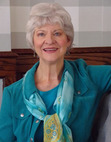Heidi M. Thomas's Blog, page 10
November 21, 2013
10 Writing Tips From Bestselling Novelist Janet Fitch
As reprinted in the Los Angeles Times
1. Write the sentence, not just the story
Long ago I got a rejection from the editor of the Santa Monica Review, Jim Krusoe. It said: “Good enough story, but what’s unique about your sentences?” That was the best advice I ever got. Learn to look at your sentences, play with them, make sure there’s music, lots of edges and corners to the sounds. Read your work aloud. Read poetry aloud and try to heighten in every way your sensitivity to the sound and rhythm and shape of sentences. The music of words. I like Dylan Thomas best for this–the Ballad of the Long-Legged Bait. I also like Sexton, Eliot, and Brodsky for the poets and Durrell and Les Plesko for prose. A terrific exercise is to take a paragraph of someone’s writing who has a really strong style, and using their structure, substitute your own words for theirs, and see how they achieved their effects.
2. Pick a better verb
Most people use twenty verbs to describe everything from a run in their stocking to the explosion of an atomic bomb. You know the ones: Was, did, had, made, went, looked… One-size-fits-all looks like crap on anyone. Sew yourself a custom made suit. Pick a better verb. Challenge all those verbs to really lift some weight for you.
3. Kill the Cliché.
When you’re writing, anything you’ve ever heard or read before is a cliché.They can be combinations of words: Cold sweat. Fire-engine red, or phrases: on the same page, level playing field, or metaphors: big as a house. So quiet you could hear a pin drop. Sometimes things themselves are cliches: fuzzy dice, pink flamingo lawn ornaments, long blonde hair.Just keep asking yourself, “Honestly, have I ever seen this before?” Even if Shakespeare wrote it, or Virginia Woolf, it’s a cliché. You’re a writer and you have to invent it from scratch, all by yourself. That’s why writing is a lot of work, and demands unflinching honesty.
4. Variety is the key.
Most people write the same sentence over and over again. The same number of words–say, 8-10, or 10-12. The same sentence structure. Try to become stretchy–if you generally write 8 words, throw a 20 word sentence in there, and a few three-word shorties. If you’re generally a 20 word writer, make sure you throw in some threes, fivers and sevens, just to keep the reader from going crosseyed.
5. Explore sentences using dependent clauses
A dependent clause (a sentence fragment set off by commas, dontcha know) helps you explore your story by moving you deeper into the sentence. It allows you to stop and think harder about what you’ve already written. Often the story you’re looking for is inside the sentence. The dependent clause helps you uncover it.

Coffeepot Rock
6. Use the landscape
Always tell us where we are. And don’t just tell us where something is, make it pay off. Use description of landscape to help you establish the emotional tone of the scene. Keep notes of how other authors establish mood and foreshadow events by describing the world around the character. Look at the openings of Fitzgerald stories, and Graham Greene, they’re great at this.
7. Smarten up your protagonist
Your protagonist is your reader’s portal into the story. The more observant he or she can be, the more vivid will be the world you’re creating. They don’t have to be super-educated, they just have to be mentally active. Keep them looking, thinking, wondering, remembering.
8. Learn to write dialogue
This involves more than I can discuss here, but do it. Read the writers of great prose dialogue–people like Robert Stone and Joan Didion. Compression, saying as little as possible, making everything carry much more than is actually said. Conflict. Dialogue as part of an ongoing world, not just voices in a dark room. Never say the obvious. Skip the meet and greet.
9. Write in scenes
What is a scene? a) A scene starts and ends in one place at one time (the Aristotelian unities of time and place–this stuff goes waaaayyyy back). b) A scene starts in one place emotionally and ends in another place emotionally. Starts angry, ends embarrassed. Starts lovestruck, ends disgusted. c) Something happens in a scene, whereby the character cannot go back to the way things were before. Make sure to finish a scene before you go on to the next. Make something happen.
10. Torture your protagonist
The writer is both a sadist and a masochist. We create people we love, and then we torture them. The more we love them, and the more cleverly we torture them along the lines of their greatest vulnerability and fear, the better the story. Sometimes we try to protect them from getting booboos that are too big. Don’t. This is your protagonist, not your kid.
Janet Fitch is the author of “White Oleander” and “Paint it Black,” and she teaches writing at USC. It seems like every time I run into her at a reading, she introduces one or two or more of her students who she has encouraged to come along, people whose work she praises. This enthusiastic engagement makes her, well, nicer than many writing teachers, and that niceness might be why she’s posted a list of 10 writing tips that can help almost anyone on her blog. But the list shows that just because she’s nice, she’s no pushover in the classroom.


November 15, 2013
Cowgirl Dreams Getting New Life
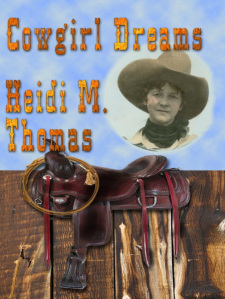 Today I sent the manuscript edits for Cowgirl Dreams back to my new publisher, Globe-Pequot/Twodot Press. My first novel, along with my second in the “Dare to Dream” series, Follow the Dream, and my new novel, Dare to Dream will all be released on May 6, 2014. Finally!–for all of you who have been patiently waiting!
Today I sent the manuscript edits for Cowgirl Dreams back to my new publisher, Globe-Pequot/Twodot Press. My first novel, along with my second in the “Dare to Dream” series, Follow the Dream, and my new novel, Dare to Dream will all be released on May 6, 2014. Finally!–for all of you who have been patiently waiting!
While there were not a lot of changes to be made, this process just points up how important it is to for writers have your work edited! Even though this book has been through an editing process before it was first published in 2008, and even though I am a freelance editor, there were still things that were missed.
So…even editors need editing!
We don’t have a cover design yet, but stay tuned. I will keep you posted on the developments as they progress toward giving Cowgirl Dreams and Follow the Dream new life!


November 9, 2013
Celebrating a Cowboy’s Birthday
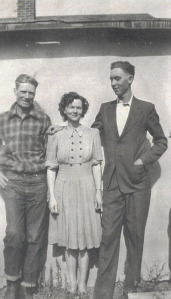
Dad, Grandma & Grandpa
My dad, Don Neil Gasser, was born November 9, 1924. He would’ve been 89 today.
He grew up in the Cut Bank/Sunburst area in Montana (often known nationally as the coldest spot in the nation in the winter). His mother, my grandmother, was the rodeo-riding cowgirl I’ve written about in my novels Cowgirl Dreams, Follow the Dream, and the newest, Dare to Dream, scheduled to be released May 6, 2014.
Dad was an only child and the little family moved many times over the years, following the grass for their Percheron crossbred herd. He was six years old when they trailed 100 head of horses from Cut Bank to Salmon Idaho in the early 1930s to find grass, after drought and grasshoppers left Montana tabletop bare. He remembered that adventure vividly and that became one of the pivotal events in Follow the Dream.
I remember my 6’4″ dad as a quiet, soft-spoken man, an avid reader and student, although he
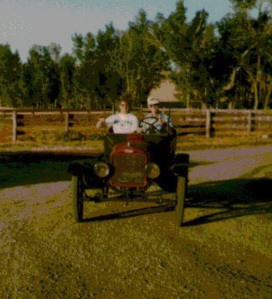
Dad & I in his rebuilt Model T
never attended college. He taught himself to read at least three languages, memorized passages of the Bible while driving tractor, and passed on the love of books and music to me and my brother Mark. Dad was, out of necessity, an inventor, a mechanic, a veterinarian for his own and neighbors’ cows. Anything that needed done, my dad could do. And he was a real cowboy–when he was astride his horse, he rode so smoothly you could hardly tell where the man ended and the horse began.
Dad passed away in 2003, much-loved and well-respected by all who knew him. Happy Birthday, Dad!


October 31, 2013
Kanab Writers Conference
I was thrilled to be on the presenters’ roster last weekend at the Kanab, UT, Writers Conference. I joined 11 other authors in giving workshops to 83 attendees.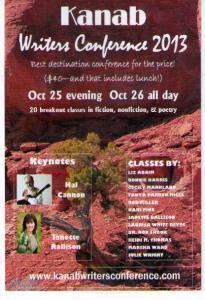 My workshops included “Marketing Your Writing” and “Show versus Tell.” I had a nice turnout and received good feedback.
My workshops included “Marketing Your Writing” and “Show versus Tell.” I had a nice turnout and received good feedback.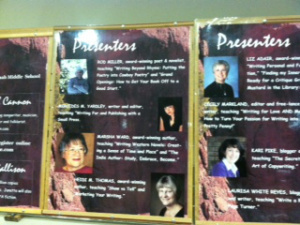 Mostly, I had fun doing it, and if I was able to give some help to other writers, that’s icing on the cake.
Mostly, I had fun doing it, and if I was able to give some help to other writers, that’s icing on the cake. Kanab is a beautiful area, with sunrises accentuating the vibrant red rock hills and cliffs. Population about 35,000, Kanab is described as being in the “Grand Circle” area, centrally located among Vermilion Cliffs National Monument, Bryce Canyon National Park, the Grand Canyon (North Rim).
Kanab is a beautiful area, with sunrises accentuating the vibrant red rock hills and cliffs. Population about 35,000, Kanab is described as being in the “Grand Circle” area, centrally located among Vermilion Cliffs National Monument, Bryce Canyon National Park, the Grand Canyon (North Rim).


October 24, 2013
Why Do We Like Conflict?
OK, you’ve decided to write a story and you’ve created a character. Now you have to give her a problem to solve and put him in some kind of jeopardy. Life is a series of choices, and every choice implies a conflict. You make one choice and the consequences are _____ or you choose the other option, and the consequences are ______.
For a reader to care about your story, there has to be something at stake—something of value to gain, something of value to lose. One writer terms it “wrestling”—two strong forces meet, one triumphs over the other, for better or for worse.
Conflict can be external: a villain, an opponent, a set of circumstances, the environment or landscape. It can be internal: fear, distrust, uncontrollable rage, a number of things. A book can have both. In Lord of the Flies, what’s at stake externally is survival; internally, it’s fear vs courage. Every character should have the potential to conflict with every other character, whether that potential is realized or not.
Is it a fair fight? A motivation against no opposition is boring. A character who always gets everything he wants, succeeds in  every task, wins the girl/guy with no problem, has no drama. Remember PLOT is a VERB. Likewise, pure victimization is not only dull, but depressing.
every task, wins the girl/guy with no problem, has no drama. Remember PLOT is a VERB. Likewise, pure victimization is not only dull, but depressing.
Conflict doesn’t come in oppressing or being oppressed—it comes in the struggle to break free. The reader wants the final outcome to be in doubt. He likes the anticipation of conflict, a situation created where conflict is waiting to happen. (i.e. Character A is a former Nazi and B is a Holocaust survivor. Neither knows this info about the other. They sit in a room & make small talk. All the while, we wait for the conflict to erupt. Maybe it never does. Maye it’s chapters later, after they’ve become friends.)
Which leads us to the next step: Storytelling is not about giving away information, but about withholding it.
Why do we prefer to sit down with a 300-page book (or in the case of Harry Potter, 800 pages), rather than just read a 2-3 page synopsis of a story?
Because we want suspense, we want to go on this journey, this adventure, with someone we can care about.
Suspense is about anticipation. It is about what we do not have, what has not happened, about what might happen. It’s about the process of watching events unfold. (i.e.While the victim is being stalked, suspense looms. Once the victim is murdered, the suspense disappears.) Waiting to find out builds suspense, drama.
Creating Suspense.
The goal. What does the character want to achieve?
The stakes. What is at risk for the character?
Danger. remember that danger is a matter of perspective—it only needs to exist in a character’s head to create suspense.
The Ticking Clock. A time limit heightens suspense.
inability to take action. For example, in Hitchcock’s the Rear Window, the protagonist has a broken leg, hears the killer approaching, but is helpless to go anywhere.
The Unknown. We can bear almost any form of torture as long as we know what it is we are getting into. But keep us in the dark, give us time to think about the possibilities and the suspense will be unbearable.
Kurt Vonnegut once said that a hero “should always want something, even if it’s just a glass of water.” An instructor in a writing class told us there should be conflict on every page, even if the character is too hot or cold.
Here’s a great blog post by Kristen Lamb “Giving Life to Your Fiction.“
What other ways have you written or read that create tension or conflict?


October 17, 2013
So Many Dreams, So Little Time…
This article is reposted with permission from Writing-World.com
by Moira Allen
I’ve written before about the myths that surround the idea of “being a writer.” All too often, we imagine that a “writer” is so many things that we are not — and because we don’t measure up to our own idealized view of “what a writer is,” we assume we aren’t REALLY writers. This problem tends to plague us no matter how much we’ve actually written; even experienced writers tend to measure themselves against myths rather than realities!
One myth that plagues writers is the myth of the “One Dream.” Real writers, we often assume, are driven by this “one dream” — the dream of BEING a writer. That dream is more important, more powerful, more motivating than any other force or desire in a writer’s life. It’s the dream that keeps you writing, no matter what. It’s the desire that outweighs all other desires, the burning hunger, the aching need, the… well, you get my drift.
It’s a bit like Frodo’s “One Ring” — the ring that rules, and binds, them all.
The flip side of this myth, of course, is the notion that if you AREN’T driven by this single, all-encompassing dream, you aren’t really a 100% motivated writer. Oh, sure, you may WRITE, but you’re not consumed by the passion for writing — you’re not giving it your all. If you’ve bought into the one-dream myth, you may assume that if writing isn’t the most important thing in your life (as measured by your devotion to it), you don’t “have what it takes,” and you’re doomed to failure. (Or, at least, to the mid-lists.)
There may certainly be writers out there who have one dream, and one dream only. But in talking to writers from all walks of life and from all around the world, I’ve begun to see how dangerous this myth is. Because MOST of us are, let’s face it, basically “ordinary” people. We aren’t starving artists laboring by candle-light in a garret on the Left Bank, swilling absinthe to fuel the muse. We’re spouses. We’re parents. We’re employees.
We’re homemakers. We’re students. We’re teachers. We run businesses, volunteer, work out. We have cats, dogs, budgies, hobbies. We have many hats. And we have many dreams.
For example, one dear friend has, after years of striving, found herself achieving her dream of a successful illustrating career.
Suddenly, she says, she has more offers than she can handle. This is the fulfillment of a dream — but ironically, she says, it means her dream of becoming a novelist must go on hold. “People are surprised to hear that I’m also a writer!” she tells me.
As another example, our intrepid newsletter editor put her writing dreams on hold for a couple of years so that she could focus on home-schooling her daughter. For her, the dream of ensuring that her daughter had the best possible education — which, in turn, involves the dream of giving her daughter the best possible chances for the future — took precedence over the dream of writing that novel.
 For many, the dream of making a better life for oneself or one’s family — or, in these troubled times, just ensuring that one keeps a roof overhead and food on the table — outweighs the dream of “being a writer.” If we have families and loved ones, our dreams typically focus on their well-being and happiness as well as our own goals and desires. Often, those dreams are time-sensitive: We can’t put a child’s future “on hold” while writing a novel, so more often than not, it’s the novel that goes on hold while we give our children the love, skills, and support they’ll need to be able to pursue their OWN dreams down the road.
For many, the dream of making a better life for oneself or one’s family — or, in these troubled times, just ensuring that one keeps a roof overhead and food on the table — outweighs the dream of “being a writer.” If we have families and loved ones, our dreams typically focus on their well-being and happiness as well as our own goals and desires. Often, those dreams are time-sensitive: We can’t put a child’s future “on hold” while writing a novel, so more often than not, it’s the novel that goes on hold while we give our children the love, skills, and support they’ll need to be able to pursue their OWN dreams down the road.
Besides having dreams, we also have what Patricia Fry describes in her new newsletter as “passions.” (Find out more about Patricia’s new newsletter, “Publishing/Marketing News and Views,” at
http://www.matilijapress.com/publishingblog/?page_id=2727.)
Passions are a bit different from dreams, as they tend to involve the here-and-now, rather than long-term goals. But they are no less important. Fry mentions her passion for cats, walking, and writing. My husband has a passion for archaeology; I have a passion for photography. He plays computer games; I collect Victorian magazines. We’re both just a wee bit obsessive about our cat. Most writers have a passion for reading (when my sister asked how I “found so much time for reading,” I thought, if I had to explain it, she’d never understand!). Passions are a part of what defines us. Like dreams, they help us define what “matters” in life, and where we’re willing to invest our time, energy and resources.
But there are only so many hours in a day, so many days in a year.
Having multiple dreams and multiple passions means making multiple trade-offs. Inevitably, that means that some dreams (and perhaps some passions) get postponed, put on hold, shifted to the back burner. Some dreams (like raising a child) are time-sensitive; when their window is gone, it’s gone. Other dreams may be unattainable until more time has passed — until one has learned a skill, overcome an obstacle, or just reached a different place in life.
And here’s where it gets sticky for writers. Too often, when our career isn’t where we want it to be, or where we think it ought to be, we assume the fault is “lack of motivation.” If I really, REALLY wanted to be a writer, more than anything else in the world, I’d be writing more. I’d be farther along in my novel. I’d be published by now. I’d… well, I’d be somewhere I’m not. And once we assume that we WOULD be “somewhere else” in our writing career if writing were truly that important to us, it’s easy to assume that, because we’re NOT “there” yet (wherever “there” is), that must mean writing ISN’T that important. And if it isn’t — if it’s not our all-consuming dream, desire and passion — then perhaps that means we’re not cut out to be “real” writers.
If this sounds at all like you, then perhaps it’s time to take a step back and look seriously at your dreams — ALL of them.
Perhaps you haven’t even thought of what you’re doing as pursuing a dream — educating your child, for example. You just know that it’s important, perhaps more important than anything else. Or, perhaps, you’ll find that you’re pursuing dreams that no longer have as much meaning, that have become a habit, and that could be put aside for something else. But you’re certainly going to find out that you have, not just one, but many dreams — and many that are truly important and worthwhile.
The myth of the single-minded writer who lives to pursue one dream and one only may indeed apply to some. Most of us, however, are not so much single-minded as “multi-faceted.” And I can’t help but believe that, though it can be frustrating at times, it’s also a useful quality. A writer who has many dreams, many passions, and many things going on in life is one who will, ultimately, have a great deal to say!
Moira Allen is the editor of Writing-World.com (http://www.writing-world.com) and the author of more than 350 published articles. Her books on writing include Starting Your Career as a Freelance Writer, The Writer’s Guide to Queries, Pitches and Proposals, and Writing to Win: The Colossal Guide to Writing Contests.


October 3, 2013
The Weeping Willow Sings: A Fine Debut Novel
 I’m excited to feature Billie Grable and her debut novel, The Weeping Willow Sings. She and I were classmates in the University of Washington Commercial Fiction certification course in the early 2000s. It’s great to see the final product that came from that beginning.
I’m excited to feature Billie Grable and her debut novel, The Weeping Willow Sings. She and I were classmates in the University of Washington Commercial Fiction certification course in the early 2000s. It’s great to see the final product that came from that beginning.
Welcome, Billie. Where did the inspiration for your novel come from?
I have to say that the book evolved over a very long time. When I first started writing, I was doing a memoir. I wrote madly for days – pouring my life and soul onto paper. Then one night I heard a famous person being interviewed on TV about a memoir she’d published. The interviewer asked her “Is there anything you wish you could take out of your book?” Her immediate answer was something like Chapter 4 and 15 – I clearly remember her answering without hesitation and I thought, do I really want to put my life in print – and never be able to withdraw those private moments? Would I live to regret it? I now call that piece of work my ‘past purging’ and I must say it was not only liberating, but it rekindled my love for writing!
From that point, I tried to ‘convert’ my life to fiction. I remember one of the exercises we did in the Commercial Fiction class where we had one of our characters write us a letter. Becca (the main character that had been shaped from my life) ‘wrote’ to me. She told me in no uncertain terms that I’d already made all of those mistakes and that she wanted to make her own mistakes. The letter ended with her telling me if I couldn’t honor her request, to leave her out of the book. Imagine how surprised I was when I finished writing the letter – and how real those voices in my head became! J I took Becca’s advice and she became a secondary character.
John, Maggie’s father developed over time. I knew that he was going to die from the very beginning. What I didn’t realize was how attached to him I’d become and how his death haunted me. That is when I realized that he would remain a central character and his life after death experience one of the main themes.
Mental illness has had a huge stigma attached, but we are all becoming more aware and accepting. Was this a difficult subject to write about?
Not at all. And now I shall air some of my own family secrets. J My great aunt spent her later years at what used to be called the Oregon State Insane Asylum. I remember going there as a little girl (about five years old) and sitting with her. What I loved about her was her laughter. She’d start giggling and I would too. Then she’d break out into uncontrollable laughter and I’d join in. I never really knew why she was laughing but I just loved that she did. I didn’t find out until I had kids of my own that she was schizophrenic.
Remembering my great aunt and how, as a child, I had no point of reference to make me afraid of her, made me realize that there are types of mental illness that are feared. The sad part is she ended up in a mental hospital that used shock treatments as part of the therapy (and back then they did serious damage!). I like to think that her life would have ended up much differently had she been able to take advantage of today’s methods of treatment. Having said that, there are so many people who have mental illness and are too ashamed to come forward and seek treatment. That’s where John’s mental illness came into the story. I wanted him to be able to confront where he came from and what he’d done, so he could heal – and also provide healing to those he left behind.
Is there a message in your novel you want readers to grasp?
The single most important message to me is that love never dies. The other message is for people who have lost a loved one to suicide – being able to give them an opportunity to somehow make peace with such a tragic ending.
Have you always wanted to write?
 Yes! Ever since I was a little girl, I’ve made up stories in my head. And now, I have the ability to listen to those characters and give them a chance to tell their story. The part I love most is letting go of my need to control and allowing them to give me the shape of their life (and yes, I am a control freak J).
Yes! Ever since I was a little girl, I’ve made up stories in my head. And now, I have the ability to listen to those characters and give them a chance to tell their story. The part I love most is letting go of my need to control and allowing them to give me the shape of their life (and yes, I am a control freak J).
Are there any books or authors that inspired you?
I’ve read a ton of self-help books – my favorite authors are Wayne Dyer, Iyanla Vanzant, and Cheryl Richarson and Geneen Roth. Their messages have always spoken to me.
I loved What Dreams May Come by Richard Matheson and of course The Lovey Bones. Stephen King creeps me out (in a really good way) and I loved Divine Secrets of the Ya-Ya Sisterhood. Loved The Help (movie not so much) and Water for Elephants.
What helps you with the creative process?
When I first begin a story, I process a lot of it in my head. And then I start writing on notepads that are lying around my house. I prefer to write with pen and paper at first. There’s something about connecting the pen to paper that allows the creative process a direct connection. Just feels like the words flow from the pen.
Why do you write, what is it that makes you do it? (What do you like and dislike about writing?)
I write fiction because of the characters. I love allowing them to ‘speak’ to me. It’s such an adventure. The hard part is having a big enough chunk of time to really let it flow. I work full time and while it pays the bills, it takes a chunk out of my creative process.
What was the major thing you learned from our UW writing course?
The biggest lesson was the importance of character development. You can have a plot, but without really strong characters to carry it out, you really don’t have a compelling book to read.
What made you decide to self-publish?
My Mom. She’s 86 years old and has dementia. The one thing she hasn’t forgotten is that I wrote a novel. When I gave her a copy of The Weeping Willow Sings she cried! It was an incredible moment. She is declining fast and having given her that gift was a memory I will always cherish!
What are you doing to market your book?
I have business cards that I give to just about everyone I meet. I have a Facebook author page and also a personal page. I’ve done several book signings and had a write up in my hometown newspaper. It’s really, really hard work! But I absolutely love it.
What advice would you have for other beginning authors?
Take classes. Get into a critique group. Keep your butt in your chair and find the time to write!
Are you working on another project?
I have a second novel that’s about half done. And I have an idea for a series brewing as well.
Where can readers buy your novel?
You can buy it on line at any bookstore – but go to Amazon please! Here’s the link: http://www.amazon.com/Weeping-Willow-Sings-Billie-Grable/dp/1482622866/ref=cm_cr_pr_product_top
Your website, blog, Facebook, etc.
My Facebook author page is https://www.facebook.com/BillieGrable?ref=hl
I’ve had so much interested generated that Facebook created a page for The Weeping Willow Sings! Here’s the link: https://www.facebook.com/pages/The-Weeping-Willow-Sings/585690891468723?directed_target_id=0
Thanks so much for having me Heidi! It’s so much fun to reconnect. And I love Cowgirl Dreams!
Thank you, Billie. I’m looking forward to your next book.


September 26, 2013
Where Story Seeds Come From
by Karen Casey-Fitzjerrell
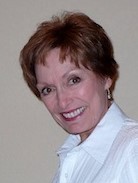 When readers ask where my story ideas come from, my first inclination is to answer with a question. Where don’t they come from? However, for this post I’ll narrow my answer to how I formed ideas for my latest novel, Forgiving Effie Beck.
When readers ask where my story ideas come from, my first inclination is to answer with a question. Where don’t they come from? However, for this post I’ll narrow my answer to how I formed ideas for my latest novel, Forgiving Effie Beck.
Years ago, I moved to a small farming-ranching community in central Texas. Most of my new friends were in their 80s and 90s, the last generation to have ridden horses to a one room school house that also served as the town hall. As the “new kid in town,” they glommed onto me like new meat. At Ladies Aide Society meetings, church socials and potluck dinners the ladies gleefully shared their colorful life stories.
Late one summer, the weekly newspaper reported a “local citizen” had alerted the sheriff that his elderly ranching neighbor, a woman, had gone missing. The whole town was a flutter about where she could be, what could’ve happened to her. And of course, church ladies shared all kinds of information with me about the missing woman’s history, though I was never able to guess where truth crossed over to gossip-mongering.
Months later, I saw a yet another newspaper announcement about a reunion of Orphan Train Riders to be held in a nearby community. I attended hoping to get a few interviews for my freelance magazine work. I met and talked with about a dozen “Orphans.” While I felt that writing about Orphan Trains had been a little overdone, it was fascinating to talk with them one on one, to hear their personal histories. I learned how orphan records were kept and why it was so hard for adopted children to find out who their parents were or why they’d been put on the trains.
And, not long after that, I stopped for lunch at a City Cafe’ after conducting interviews with some of the locals. I watched as a very large man in faded overalls lumbered through the double cafe’ doors. He heaved his girth onto a stool at the counter and started a loud conversation with the waitress. He joked that he was the Mayor of Pole Cat Creek.
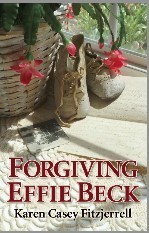 There you have three elements I used in Forgiving Effie Beck. Little seeds of facts, conversation and observation that tickled my imagination and made me wonder: What if those incidences could be fit together?
There you have three elements I used in Forgiving Effie Beck. Little seeds of facts, conversation and observation that tickled my imagination and made me wonder: What if those incidences could be fit together?
I had first hand accounts from town and ranch women about what they’d lived and what they had to say about a missing woman whose whole life existed on the outskirts of local society. In the book they became Frances, Cora Mae, and Glory.
My peek into the lives of real live-to-tell-it Orphan Train riders gave me Paddy Shaw, the grave digger.
The rotund fellow who bragged about being Mayor of Pole Cat Creek actually became two characters in Forgiving Effie Beck: Mayor Tubby Whittaker and Texas Ranger Clyde Cheevers.
When I sat down to write, the only thing I knew for sure was that I wanted to use The Great Depression Era as my historical backdrop. My ideas, for the most part, come from observing and absorbing what happens in my everyday life. Those ideas easily fit into historical settings because human nature is millennial.
For me the how, where, when and what cannot be rushed. Story takes time to develop and must have tension to hold all elements together in the same way a rubber band holds small unmatched items to a whole when it’s wound tight around them.
Karen Casey Fitzjerrell’s debut novel, The Dividing Season , won the 2013 EPIC Award for Best Historical Fiction. She is a former journalist who traveled Texas back roads for eight years in search of history mysteries and unique-to-Texas characters to include in her newspaper and magazine articles. She now lives in San Antonio, Texas.
Karen’s website is http://karencaseyfitzjerrell.com/ and Forgiving Effie Beck is available on Amazon


September 19, 2013
This Reader’s Choice
I know the summer reading season is over, but I want to share some of the good books I’ve read recently. I’m always delighted to find new authors as well as new books from favorites.
I was honored to read an advance copy (ARC) of The Art of Falling by Kathryn Craft, which will be out in January 2014. A great 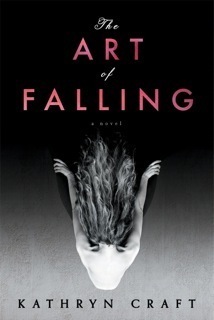 read! Penelope Sparrow, a 28-year-old dancer, has spent her entire life focusing on the perfection of her body. But when she wakes up in a Philadelphia hospital unable to move after a near-fatal accident, she can’t remember the events leading up to her crushing 14-story fall. Now, with a second chance at life, Penny must find a way to reconnect with her past and come to terms with the limitations of her body. This is a masterful portrayal of a young woman trying to understand her own past and begin again, beautifully expressing the language of dance and broken dreams.
read! Penelope Sparrow, a 28-year-old dancer, has spent her entire life focusing on the perfection of her body. But when she wakes up in a Philadelphia hospital unable to move after a near-fatal accident, she can’t remember the events leading up to her crushing 14-story fall. Now, with a second chance at life, Penny must find a way to reconnect with her past and come to terms with the limitations of her body. This is a masterful portrayal of a young woman trying to understand her own past and begin again, beautifully expressing the language of dance and broken dreams.
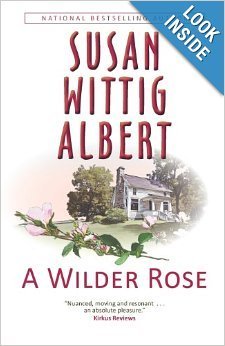 Another ARC I enjoyed is A Wilder Rose by Susan Wittig Albert, out in October. Fascinating history about our classic favorites, the “Little House” series. In 1928, Rose Wilder Lane—world traveler, journalist, highly-paid magazine writer—returned from an Albanian sojourn to her parents’ Ozark farm. Almanzo Wilder was 71 and Laura 61, and Rose felt obligated to stay and help. Then came the Crash. Rose’s investments vanished and the magazine market dried up. That’s when Laura wrote “Pioneer Girl,” her story of growing up in the Big Woods of Wisconsin, on the Kansas prairie, and by the shores of Silver Lake. The rest is literary history. But it isn’t the history we thought we knew. Based on the unpublished diaries of Rose Wilder Lane and other documentary evidence, A Wilder Rose tells the surprising true story of the often strained collaboration that produced the Little House books—a collaboration that Rose and her mother, Laura Ingalls Wilder, concealed from their agent, editors, reviewers, and readers.
Another ARC I enjoyed is A Wilder Rose by Susan Wittig Albert, out in October. Fascinating history about our classic favorites, the “Little House” series. In 1928, Rose Wilder Lane—world traveler, journalist, highly-paid magazine writer—returned from an Albanian sojourn to her parents’ Ozark farm. Almanzo Wilder was 71 and Laura 61, and Rose felt obligated to stay and help. Then came the Crash. Rose’s investments vanished and the magazine market dried up. That’s when Laura wrote “Pioneer Girl,” her story of growing up in the Big Woods of Wisconsin, on the Kansas prairie, and by the shores of Silver Lake. The rest is literary history. But it isn’t the history we thought we knew. Based on the unpublished diaries of Rose Wilder Lane and other documentary evidence, A Wilder Rose tells the surprising true story of the often strained collaboration that produced the Little House books—a collaboration that Rose and her mother, Laura Ingalls Wilder, concealed from their agent, editors, reviewers, and readers.
Forgiving Effie Beck by Karen Casey-Fitzjerrel, award-winning author of The Dividing Season. Another excellent story. Mike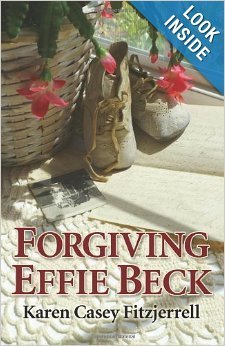 LeMay, a Federal Writers’ Project interviewer arrives in a small Texas town days before the town eccentric, Effie Beck, is reported missing. While conducting his interviews, Mike learns that the enigmatic, elderly Miss Effie has moved through the lives of the town’s populace “like brown smoke” after having suffered a harsh childhood under the discipline of a cruel father. Paralleling Effie’s mysterious disappearance is the baffling relationship Mike observes between barefoot, bird-boned Jodean Travis, the young woman from whom he rents a room, and the rest of the community. By the time the WPA bridge collapses in a horrible storm, Mike knows what happened to the baby shoe matching the one found in Effie’s house, why Jodean is ostracized by the town, the real reason the sheriff’s wife sent her kids out of town for the summer, and how hurtful it is to live where all the good people look the other way.
LeMay, a Federal Writers’ Project interviewer arrives in a small Texas town days before the town eccentric, Effie Beck, is reported missing. While conducting his interviews, Mike learns that the enigmatic, elderly Miss Effie has moved through the lives of the town’s populace “like brown smoke” after having suffered a harsh childhood under the discipline of a cruel father. Paralleling Effie’s mysterious disappearance is the baffling relationship Mike observes between barefoot, bird-boned Jodean Travis, the young woman from whom he rents a room, and the rest of the community. By the time the WPA bridge collapses in a horrible storm, Mike knows what happened to the baby shoe matching the one found in Effie’s house, why Jodean is ostracized by the town, the real reason the sheriff’s wife sent her kids out of town for the summer, and how hurtful it is to live where all the good people look the other way.
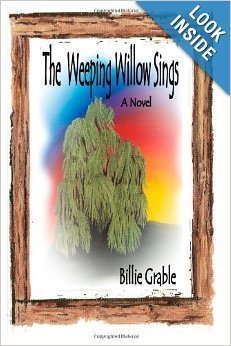 The Weeping Willow Sings by Billie Grable. This debut novel sings! John O’Brien’s suicide by drowning throws him into an afterlife he never expected. His fifteen-year-old daughter, Maggie, almost dies trying to save him, and her distorted memory of the traumatic event leaves Maggie believing that John is still alive. Maggie sets off on a journey to find her father and the mythical weeping willow he often told her about – a journey that takes her to the world between – and beyond. When Maggie’s path meets imminent danger, John must find a way to cross the threshold between life and death to save his daughter one last time. A blend of fantasy and fiction, The Weeping Willow Sings provides a glimpse into the theory of life after death and the possibility for the dead to make amends with those still living. A moving depiction about the secrets families keep, the tragic side of mental illness and the bond between a father and daughter, The Weeping Willow Sings reminds us all that love never dies.
The Weeping Willow Sings by Billie Grable. This debut novel sings! John O’Brien’s suicide by drowning throws him into an afterlife he never expected. His fifteen-year-old daughter, Maggie, almost dies trying to save him, and her distorted memory of the traumatic event leaves Maggie believing that John is still alive. Maggie sets off on a journey to find her father and the mythical weeping willow he often told her about – a journey that takes her to the world between – and beyond. When Maggie’s path meets imminent danger, John must find a way to cross the threshold between life and death to save his daughter one last time. A blend of fantasy and fiction, The Weeping Willow Sings provides a glimpse into the theory of life after death and the possibility for the dead to make amends with those still living. A moving depiction about the secrets families keep, the tragic side of mental illness and the bond between a father and daughter, The Weeping Willow Sings reminds us all that love never dies.
Others worth checking out:
Nobody’s Child by Janet Dawson. A decomposing body buried in an empty lot isdug up by a construction company, and Jeri Howard’s demanding, imperious client thinks the victim could be her daughter.
My Next Husband will be Normal by Rae Ellen Lee. A humorous, bitter-sweet memoir. Soon after unpacking their flip-flops on the paradise of St. John Island, the husband—a former Republican state legislator with a silver crew-cut and solid traditional values—realizes he is really a she.
One Foot on the Edge by C.K. Crigger. In 1896, there aren’t many career choices for a young lady. China Bohannon has fled one bad situation, and is looking to start her life over as a strong, independent woman in the wild and woolly town of Spokane, Washington.
Forever Young: Blessing or Curse by Morgan Mandel. What could possibly happen when a 55 year old widow takes a pill to be 24 forever?
The Driftwood Diaries by Ava Wilson. Three women are revealed in their diaries found by a book store owner.
Happy Reading! What are some of your favorites from this summer?


September 14, 2013
Fun Facts Trivia

Dr. Seuss coined the word “nerd” in his 1950 book If I Ran the Zoo.
It’s estimated that more than 6 billion copies of The Bible have been printed.
The Bible is the most shoplifted book in the United States.
“Pennsylvania” is missing an “n” and thus misspelled on the Liberty Bell.
The longest one-syllable word in the English language is “screeched.”
All of the clocks in Pulp Fiction are stuck on 4:20.
No word in the English language rhymes with month, orange, silver or purple.
”Dreamt” is the only English word that ends in the letters “mt”.
“From the moment I picked up your book until I laid it down, I was convulsed with laughter. Some day I intend reading it.” – Groucho Marx



